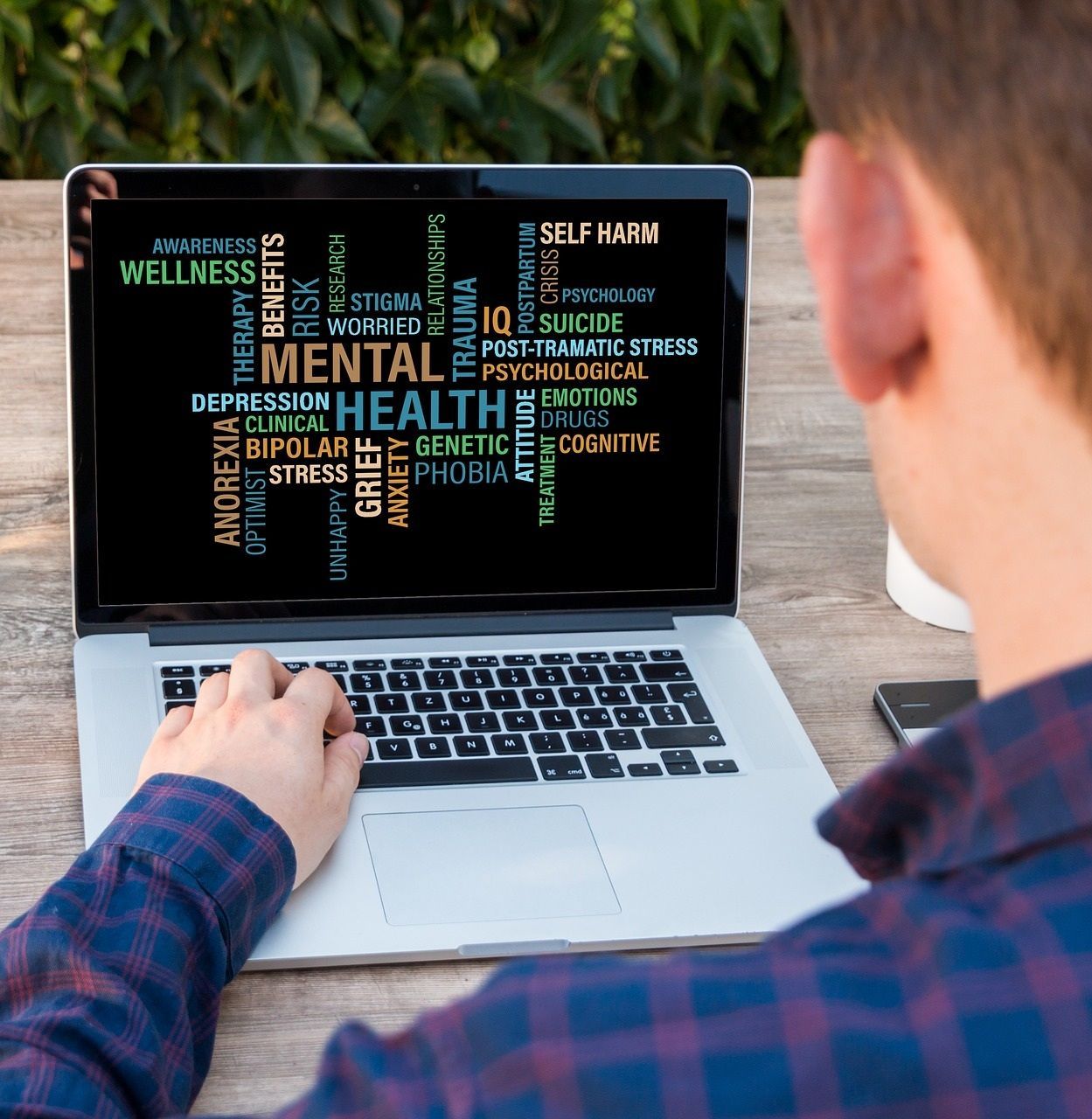EXPLORE OUR
Resources

By ccc
•
03 Oct, 2023
In our journey through life, we often encounter challenges that can impact our mental well-being. These challenges may include stress, anxiety, depression, or relationship issues. When faced with such difficulties, seeking therapy or counseling can be a transformative and empowering step towards better mental health. This comprehensive guide explores the numerous benefits of therapy and counseling, shedding light on how they can positively impact our lives. From developing healthy coping mechanisms to improving relationships and managing difficult emotions, therapy offers a range of advantages that can enhance our overall well-being. So, let's dive deeper into the world of therapy and discover how it can help us navigate life's ups and downs.

By ccc
•
11 Aug, 2023
In the fast-paced world of work, stress and anxiety can take a toll on our mental health. Many individuals find themselves overwhelmed by the demands of their jobs, leading to feelings of unease and worry. Cathedral Counseling Center is here to provide compassionate and affordable mental health support to help individuals navigate the challenges of the workplace. With a focus on Chicago, our affordable therapy options ensure that everyone has access to the care they need. In this comprehensive guide, we will explore the various aspects of workplace anxiety and provide practical strategies for coping and managing stress.

By ccc
•
24 Jul, 2023
In today's digital age, social media has become an integral part of many people's lives. It offers a platform for connection, self-expression, and information sharing. However, as the popularity of social media continues to soar, so does the concern about its impact on mental health, particularly among adolescents. Numerous studies have highlighted the potential negative effects of excessive social media use on mental well-being. In this article, we will explore the ways in which social media can influence mental health and discuss the importance of finding a healthy balance in our digital lives.

By Freda B. Friedman, PhD, LCSW
•
24 May, 2022
Every other Sunday afternoon for the past seven years, I have joined a group of eight friends, whenever I am able, to share personal and professional concerns and to give and get support. During this time, we have shared the joys and sorrows of children, grandchildren, partners, friends, and others, devastating or debilitating illnesses and life cycle transitions, and for some, anticipated or post-retirement challenges. I was thinking about my most recent meeting when I sat down to write this blog about Navigating Unprecedented Times. Being with the group provided me with an unanticipated and surprising help to put things into perspective. The agreed-upon topic: Gratitude. It’s a topic I frequently suggest to my clients to write and talk about. For some I even recommend beginning or continuing daily entries in the somewhat cliched Gratitude Journal . But, as one who too often does not practice what I preach, I have not made a regular practice of focusing on gratitude and counting my blessings. As we went around the room that Sunday, focusing on areas of gratitude, many of us veered off into the current overwhelming problems facing us internationally, nationally, locally, and within our close circle. Our skilled and compassionate group leader gently and frequently steered us away from the negatives. How quick we are to focus on them. As I listened to one after the other of my friends and colleagues talk in-depth, I found myself feeling a surge of gratitude for these women who were helping me bring a richer and deeper focus to the rich texture of my life. Thinking about the lessons learned, and the resilience gained from navigating the present and past perilous times of my life helped put them into a more nuanced perspective. I found myself feeling a newly-found gratitude for my own family of origin as Betty talked about what qualities she developed in response to growing up with her critical and demanding mother. I listened with appreciation to Ruth and others talk about how the group’s feedback, validation, and occasional challenges had helped them navigate their own difficult times. Though I think frequently and deeply about my issues, thanks to my own therapy, supervision, and clinical consultation with colleagues and self-inquiry, I realize that something different and even more profound happened during and after that meeting. Something that feels more long-lasting and deeper to hold on to as I navigate these perilous times. I realized that, yes, it’s natural that we focus on the things that make us feel unsafe. That’s human nature, biological hardwiring and, as American psychologist Stephen Porges writes, the human response to threat, according to his Polyvagal Theory. But, we often overlook Porges’ other aspect of seeking safety; finding and turning to our social supports. I too often take for granted the ways I turn to “my people” in times of perceived emotional or physical threat. I know how much pleasure I derive, the love I give and receive from my family, friends, colleagues, clients and work. But how easy it is to overlook that when in the midst of an ongoing string of unprecedented moments. The big sense of peace and contentment I felt during and after my Sunday’s group reminded me to remember to do a deep dive into gratitude every time I feel pulled down by these perilous times. I pass along the wisdom of my group to you. May you foster, build, and remember your relationships with your formal and informal groups as we navigate these perilous times. - Freda B. Friedman, Ph.D, LCSW, has been connected with Cathedral Counseling Center for more than 20 years as a clinical consultant, working on developing and implementing the program in Dialectical Behavior Therapy (DBT) and more recently, adding a variant, Radically Open-DBT (RO-DBT) for over-control. She is a clinician with more than 30 years of experience working with individuals, couples, and families across the life span and facilitating many different types of therapeutic groups. Her particular areas of interest and experience include severe personality disorders, trauma, grief, loss and life transition issues, and working with families dealing with mental illness. She has lectured widely and written articles, book chapters, and a book on these topics, including Surviving a Borderline Parent, which has been translated into several languages.

By Kerry Cochrane, LCSW
•
18 May, 2022
Most of us have experienced times of feeling overwhelmed, stressed, and unsure of when or how we’re going to get through it. Maybe it was caused by a big project, balancing the demands of home and work, or a stretch of time spent caring for a loved one during an illness. The past two years of COVID restrictions introduced other stressors, like isolation, job changes or job loss, managing working from home with children taking classes remotely, and the threat of illness. When mental, emotion, and/or physical stress extends for a long time and seems to stretch out into the future with no letup, we may end up in a state of burnout. Burnout is the extreme exhaustion and feelings of being overwhelmed resulting from prolonged stress. An important risk factor for burnout is the sense of having little to no control over the stressful situation, with no means of relieving the emotional or mental demands. People suffering from burnout feel burdened with more than they can handle, and without any clear way out. This can lead to feelings of helplessness and hopelessness. Burnout is not a medical diagnosis, but it can negatively affect mental and physical health through symptoms like: disturbed sleep overeating for comfort or to “numb out” increased alcohol consumption lowered energy decreased exercise headaches digestive troubles Other signs of burnout include: disengagement from others loss of motivation decreased productivity anxiety difficulty concentrating irritability Prolonged stress also causes physical changes that increase vulnerability to illness. If you recognize these symptoms in your life, it is important to first check with a healthcare professional to rule out depression. Burnout has been studied extensively in the context of the workplace. Employees who see colleagues laid off and not replaced, and who have to absorb extra responsibilities without extra compensation while working longer hours, can come to feel that they have no control or even influence over their work life. In fact, the sense of having little to no agency is a key risk factor for burnout. The feelings of being overburdened at work can then spill over into being unable to handle the demands at home or in relationships. While work burnout is a familiar concept, it is important to recognize that many other situations can have the same result. Family caregivers can feel burdened by the responsibility of caring for a loved one and struggle with guilt along with the exhaustion. Many adults find themselves in the “sandwich generation,” trying to manage parenthood while also taking care of aging parents. People who work in the helping professions, such as health care or education, can be at risk of “compassion fatigue” from giving so much to others without enough work-life balance. Fortunately, burnout can be addressed and even avoided by making consistent efforts to include activities that nourish or “fill up” our reserves of energy. The following is a list of recommended ways to replenish your physical and emotional energy: Moderate exercise for at least 30 minutes, such as brisk walking Yoga Reaching out for support from friends, family, or a professional Good sleep hygiene: maintain a regular sleep schedule, avoid screens for two hours before bed Eat balanced and healthful meals: limit junk food, irregular eating and excessive alcohol, start the day with a healthy breakfast Practice mindfulness: meditation is very helpful, or just take small mindfulness breaks during the day with square breathing (see below), which calms the nervous system and quickly reduces stress Square breathing Start by inhaling gently through your nose to a slow count of 4. Hold the breath for a count of 4. Then gently exhale through your lips for a count of 4. At the bottom of the breath, pause and hold it for the count of 4. Take time to be outside in nature, if the weather permits Engage in creative activities Given that burnout is caused by the pressure of unmanageable demands, focusing on the things in life that are actually within our control can lessen the impact of the many variables that are not. - Kerry Cochrane is the Director of Clinical Operations at Cathedral Counseling Center. She works with adults from diverse backgrounds to identify strengths, address difficulties, and catalyze positive change. A graduate of Loyola University and the University of Iowa, Kerry's clinical focus includes trauma, emotional regulation, and management of mood disorders; special interest in working with artists. She practices from a self psychological perspective and is also trained in DBT. - This article is a part of Cathedral Counseling Center's 2022 Mental Health Awareness Month initiative, Replenish: No One Can Pour from an Empty Cup . Throughout the month of May we are sharing tips, resources, and information to help you replenish your own cup. If you would like to help replenish another's cup and help them access mental healthcare, please make a gift today to help fund our sliding scale services.

By Karen Skerrett, PhD
•
11 May, 2022
As we acknowledge Mental Health Awareness Month, the pandemic and ongoing national/international crises continue to strain our coping resources to the limit. Our individual and collective resilience is being tested in unprecedented ways. Resilience, or the ability to learn from adversities and emerge stronger, is a great goal in theory yet often tough to carry out in practice. We hear how meditation can decrease our anxiety, and a healthy diet, good sleep, and plenty of exercise help us rebound from a multitude of stressors. While this is certainly useful advice, what we hear much less about is the way our relationships contribute to our ability to be resilient. The meaning we make of our experiences, the stories we tell in and about our close relationships, are actually the building blocks of resilience. Rather than telling stories of blame, despair, hopelessness, and disconnection, you can use your life experiences and the unanticipated challenges as opportunities to re-story your relationship in ways that focus on what matters most. Creating stories of the possible are the beacons of hope, the North Star to guide your way. Couples who can find their stories, share them first with each other, then with family, friends and a larger community are more likely to preserve a vision of partnership that sustains and nurtures through the most challenging of times. Here are the key ingredients to shaping your story and building up resilience. A Big-Picture Perspective Taking the long view encourages you to put problems in a multi-dimensional context that is unique and specific to your personality, biology, spiritual values, historical time, and current phase of life. What might look like an insurmountable obstacle in the moment may prove to be a building block to a stronger connection in the future. What might look like incompatibility or a character flaw may also, and perhaps more deeply, be a moment of development that invites change. When we shift our focus from feeling happy in our relationship to looking for purpose and meaning, we’re more likely to define the challenge as manageable, even positive. The joint pursuit of meaning and purpose can also help overcome problems because partners change at different rates. Individual partners always bring varied levels of resources and skills to manage a challenge at any given time. Thinking about our lives in full and our past and present stories helps to better shape an intentional future for our relationship. A “We” Attitude Couples with a team or “We” approach to life challenges show greater satisfaction with their relationship and better physical and mental health. The qualities of We-ness can be remembered by the acronym SERAPHS: Safety Empathy Respect Acceptance Pleasure Humor Shared Meaning and Vision These qualities can be cultivated so you can learn to think and act with the best interest of your relationship in mind. A “We” attitude represents a sense of mutual identity (who we are) and affirms your commitment to being connected in mutual care (how we love). We-ness gives your relationship a storyline that prioritizes your connection and helps you act in ways that benefit the team rather than either individual. It is a mindset that helps you take joint responsibility for issues you’re facing. Partnerships then become anchored in friendship and sustained by intentionally created networks beyond the partnership. Trust is the cornerstone of resilient relationships; love is remembered and honored. A Culture of Gratitude Viewing disagreements as inevitable and focusing on what goes well, even in the face of challenges, proactively creates positives. Relationships, just like our muscles, strengthen through a recurring process of stress and repair. Repair requires the capacity to be vulnerable-to say “I’m hurting” and to hear “How can I help” and “What can we do to make it better?” Approaching differences with curiosity, not seeking the “truth” but rather to understand each other’s perspective is key. Practice a charity of interpretation and give more positive feedback than complaints. Empathize, invite care, and offer emotional support to yourself and one another. Focus on the positive contributions your partner is making and express appreciation on a regular basis. That habit will go a long way when times are the toughest. Openness to Change and Growth As in nature, we change when time and conditions are ripe. However, we can nudge and nourish both processes along, and once repair and renewal begin, there is no going back. Like all other worthy endeavors, growing your resilience takes attention and nurture. No matter how tempting, resist “settling” and aim for growth and change, not accommodation. Partners who help us become a better version of ourselves become more valuable and important to us over time. Different phases of the lifecycle as well as different kinds of challenges offer different ways to expand. Interested in learning more? Check out my new book, Growing Married: Creating Stories for a Lifetime of Love - Karen Skerrett, PhD, is a psychologist in private practice and a long-time consultant at Cathedral Counseling Center. She leads the monthly Couple Consultation Group and guided the design of the Premarital Program. She was most recently an Associate Clinical Professor at the Family Institute at Northwestern, the co-author of Positive Couple Therapy (Routledge Press, 2014), and the co-editor of Couple Resilience (Springer Press, 2015) as well as numerous book chapters and professional articles. - This article is a part of Cathedral Counseling Center's 2022 Mental Health Awareness Month initiative, Replenish: No One Can Pour from an Empty Cup . Throughout the month of May we are sharing tips, resources, and information to help you replenish your own cup. If you would like to help replenish another's cup and help them access mental healthcare, please make a gift today to help fund our sliding scale services.

By Deena A. Nardi, PhD, PMHCNS-BC, FAAN
•
26 May, 2021
Resilience is a dynamic attribute foundational to staying well. It is the ability to “adapt and thrive,” even during stressful, trying, and hurtful times. Resilience is an art and a biologic science. Resilient people use information, intention, and a calm awareness to build the skills that support them as they endure, recover, and then move on to continue to be fully engaged in life as much as they can. Anyone can build and strengthen their resilience. We are all adapting to a new kind of health and wellness culture even as we begin to emerge from the isolation that has defined the last year. You can cultivate resilience by using these basic skills listed below to support yourself as you negotiate this new normal.

By Elisabeth Ihlenfeld, LCPC, CCTP-II, CMHIMP
•
19 May, 2021
It’s hard to relate to Life Before the Pandemic. It’s like there is a line drawn in the sand between then and now, and the sand on that side seems to have drifted to a distant shore. But one thing hasn’t changed and that is a perspective of mine that was true before and has become more emphatically so since. Pre-COVID, I frequently posited to clients that one of the key metrics of mental health is the extent to which one is able to dangle in the uncertainty of the unknown. With that in mind, if we consider the last fourteen months or so—which history will likely record as one of the most dramatic eras of uncertainty most of us will face in our lifetimes, in terms of public health, politics, crime, and social upheaval—it’s fair to say our “dangle capacity” has been put to serious test. If the stats on our collective mental health are accurate, it has become apparent we’re not scoring very well on that key metric.



